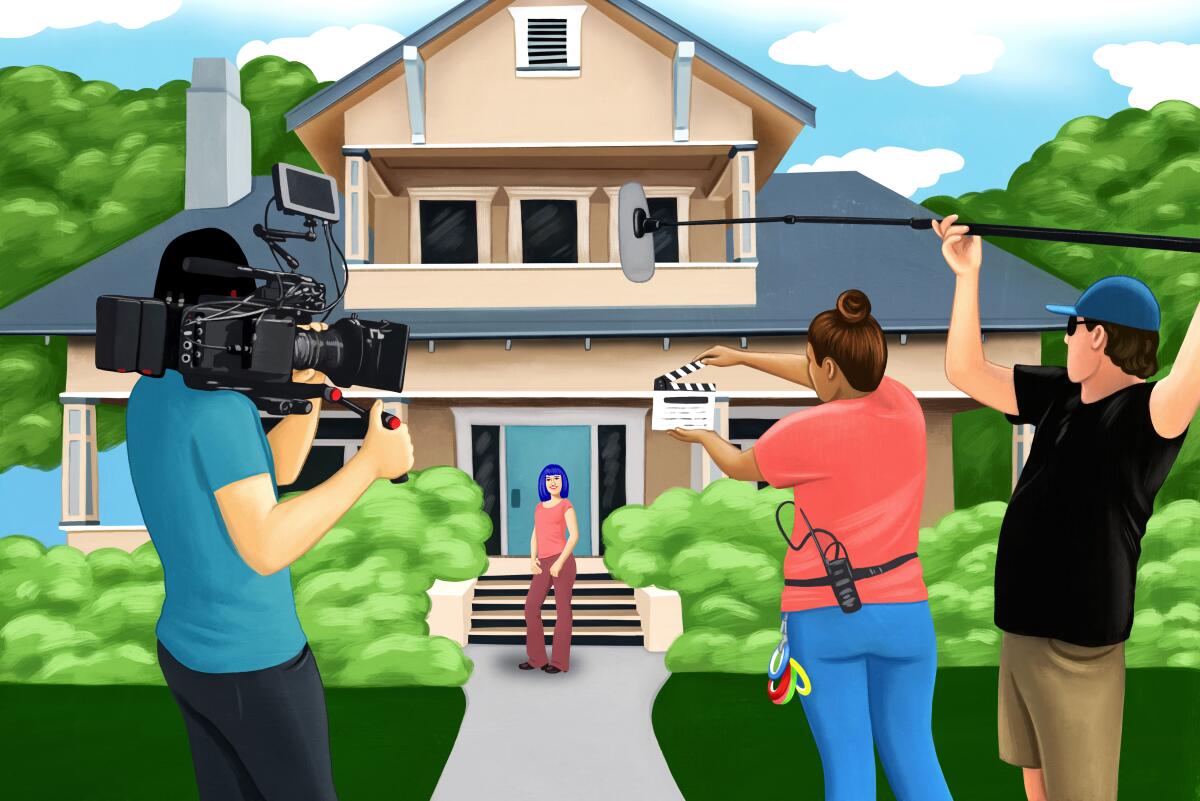Need extra cash? How to rent your home as a filming location

- Share via
It’s a common sight around Los Angeles: a line of trailers, campers and generators parked on a leafy residential street, signaling that some lucky homeowner has landed a film shoot. That’s a nice payday for them, even though it can be an inconvenience for everyone around them.
And if you’re seeing the array of Star Waggons and craft services trucks in your neighborhood, you may very well be asking yourself, “Why aren’t they shooting at my house?”
The answer may simply be that you didn’t take the steps needed to put your home on the industry’s radar. But it may also be that your neighbor’s house offered a film crew more of what it’s looking for in a workplace.
A lot of property owners are competing for these shoots, so filmmakers can afford to be picky. It’s a rare thing indeed to have your home host a film crew, said Russ Fega, owner of Home Shoot Home, a location services agency in the San Gabriel Valley.
And because locations have to match the needs of the script, your home’s style, setting and landscaping may rule it out from the get-go. The truth, experts say, is that factors outside of your control are the ones with the most influence over these decisions.
Nevertheless, there are a few things you can do to make your home more or less likely to attract a film shoot. Here’s what you need to know about location shoots and what the crews making commercials, TV shows and feature films look for in a house.
On Locations
How does your house get the industry’s attention?
Experts say that while some houses are used repeatedly, there is a constant search for new places to film. Two groups active in these searches are location scouts, who work for the folks doing the filming, and location services agencies, which represent property owners who want to host shoots.
You may already have found a business card from a scout or an agency stuck in your door — that’s one way to start a conversation about using your home for film shoots. But you don’t need to wait for the industry to come to you. The California Film Commission offers tips on how to market your home as a filming site. And for a $5 fee, the commission will send you contact information for more than 300 location scouts working in the state.
Many Southern California cities also have film offices that oversee film shoots within their borders, and these offices typically maintain a directory of local homes available for film shoots. To find out how to get your home into your local film office’s directory (or even if your city has one), consult the state film commission’s directory of regional film offices.
Alternatively, you can look for a location services agency to represent you. Fega, a former location manager, said companies like his are essentially agents for homeowners, pitching their houses for film shoots, negotiating terms and generally looking after their clients’ interests. And, like agents for actors, location agencies take a percentage of the rental fees that homeowners collect.
“The look and style of the home is most important,” said Hunter Davis, senior acquisitions agent at Real to Reel in Van Nuys. “But in regards to overall reach and exposure to the film industry, a home that is represented by a professional location agency will generally have many more filming opportunities than a home that is not represented.”
Fega and Davis are at full-service agencies, which represent property owners through every step of the process. There are also more limited, web-based services such as Giggster and Set Scouter, which offer a searchable list of available homes in addition to handling bookings and billing online.
It’s easy to find the names of location agencies online. But experts recommend checking a firm’s reputation and experience before signing up. A good place to start is your town’s film office, if it has one. (If you’re in the city of Los Angeles, though, don’t look for suggestions from FilmLA — there are too many agencies working there for the city to recommend any, Fega said.) You should also ask other homeowners who have hosted film shoots about the agents they’ve encountered.
One thing to check: According to the state film commission, California law requires location agents to be licensed by the state as real estate brokers. You can check the state’s directory at the Department of Real Estate site.
You’d pitch your home to a location agency the same way you’d pitch it to prospective buyers — with pictures showing off the interior and exterior spaces and any special features. Be forewarned, though, that these companies may be selective about whom they represent.
What are filmmakers looking for?
The main factor in the choice of a shooting site is the fictional setting in the script. That may not matter so much for commercial buildings — a vacant hospital in Los Angeles looks a lot like a vacant hospital in any other city. But a Spanish bungalow in El Sereno is a poor stand-in for a Federal-style home in Philadelphia.
That’s why the style of your house is so important to location scouts. If it doesn’t match the setting, it won’t make the cut. And filmmakers may have something very specific in mind; in fact, they may even have photos of the kind of house they’re looking for.
Davis said in an email that TV productions often follow trends, and these days the hot setting is Texas. “Therefore, a one-story ranch-style home with no palm trees and a big yard seems to be [in] higher demand than normal,” he said. “Over the last six months, we’ve received a good deal of requests for ‘Texas home looks’ for a variety of different shows. ...
“The same has been true with shows set in Atlanta and/or other areas of the South. ‘Anywhere, U.S.A.’ is also a popular trend that never goes out of style. It is a staple of what L.A. productions are always seeking.
“In general, you’re off to a good start if you have a decent size home located in a film friendly part of L.A. with no visible palm trees in the front or back yard. Not having palm trees is typically a good thing because it means your home can play for other cities/areas outside of L.A., which goes back to the ‘Anywhere, USA’ look that productions are seeking on a regular basis. (That is, of course, unless the scene in the script calls for palm trees!)”
Location, location, location! Pretend you’re a part of the movies by heading to a bar featured in ‘Once Upon a Time … in Hollywood’ or dancing where the lovers flirted in ‘La La Land.’
What’s important inside your house?
After that, experts say, it comes down to much more practical considerations, starting with the size of the rooms. “Just imagine you have a camera and all these people behind it,” Fega said. “Rooms have to be bigger. ... You want to have size, in terms of just having enough room to move around.”
Lori Davis Denny is one of those homeowners who’s seen repeat business from film crews. Her place is a sprawling Craftsman-style house in South Pasadena designed by the architects Greene & Greene, but the companies renting her house don’t choose it for the design or the decorations, she said. “They use my house because it has space. It’s more about the space for them to put their equipment.”
That might include a space to set up monitors so the production team and their clients can review videos, a convenient place for the lights and other equipment they need to be readily available, a room to do hair and makeup, a space for child actors to work with their tutors, and a place for the animals being used in the shoot, Davis Denny said, adding, “You really need a lot of rooms to pull it off.”
Production companies also value a house whose looks are malleable enough to represent more than one home at a time. Davis Denny’s house gets used repeatedly because “it can be used or transformed to look like multiple different locations,” she said. “For example, my kitchen was transformed into a retail flower show, the basement was a dorm room, my guest bedroom [made to look] like ‘Grandma’s house,’ etc. ...
“If someone has a house with a cohesive ‘style’ throughout, it may beautiful but may be less versatile to a film crew. My house saves them time and money because they don’t have to go to multiple homes to film. Or they might choose to film three different scripts for the same company.”
Fega said that it may help “if there’s some attribute about your home that makes it really special,” such as a vintage kitchen or “something truly unique.” Otherwise, he said, furnishings, wall colors and other decorative touches won’t make much difference to a film crew, good or bad. “If your wall doesn’t work or that chair doesn’t work, they’ll make it work,” he said.
One thing homeowners can do to make their house more appealing is winnow the stuff crammed into it. A house that’s cluttered with furniture and memorabilia, Fega said, may strike a production as too much work to be worth the trouble. After all, he said, “there are so many homes for these people to choose from.”
What about factors outside the home?
One potential deal-breaker is parking. If you live on a street too narrow to accommodate the 35-foot trucks that bring the film crew’s equipment to a shoot, the chances of you hosting a production drop dramatically.
The exception, Fega said, is if it’s a big-budget movie. If Martin Scorsese wants to use your house, Fega said, the crew will find a place to park.
Davis said local permitting restrictions can be a barrier too — some cities require filmmakers to jump through more hoops and shoulder more costs to get permits. Other considerations, he said, include the potential hurdles placed by homeowners associations and the neighborhood’s tolerance for film shoots.
Production designers are both creatives and bosses.
How does your house ultimately get chosen?
“You’re going to have a lot of auditions,” Fega said. “If a scout says, ‘The director’s going to love this,’ don’t count on it.”
The first step is done remotely, when a location scout compares pictures of a few dozen potential sites that were gathered from various sources. After narrowing the list to a handful of places that are both suitable and available, the scout will visit the homes to take photos and check out the filming logistics, such as the layout of the house and the parking situation on the street, Davis Denny said.
The scout then meets with the production team and narrows the choice down to a couple of places. If your house makes the cut, Davis Denny said, the director will visit, usually with a few people from the art department, and see how your home matches up against a storyboard of the scene or commercial being filmed. The director will check the camera angles, and the art department will decide what to do about the furnishings and decorations.
If it’s a commercial, the ad agency and its client will have the last word on whether to use your home, Fega said. If your house makes the final cut, Davis Denny said, there could be one more session called a “tech scout,” where the engineering aspects of the shoot are ironed out. That’s when the crew will seek your permission for any temporary changes to the structure — for example, removing an awning or painting a wall.
By the way, she said, you won’t get paid for the hours spent on the various scouting visits, even if your house is chosen.
The first step in your Hollywood career shouldn’t be paying L.A. rent. Here’s how to take your first steps toward a career in the entertainment industry, according to experts.
What about the folks next door?
“Neighbors can really make it difficult,” Fega said. “I would ask myself, ‘Am I friends with my neighbors? Are we all good?’”
Some jurisdictions require you to obtain a certain number of neighbors’ signatures before they’ll grant a permit. And neighbors may demand compensation for their trouble — for example, they may want to be paid for giving up the parking spaces in front of their homes. Davis Denny said her neighbors make about $300 each in “inconvenience fees” every time there’s a shoot at her house.
South Pasadena has tried to limit the imposition posed by filmmakers by tightening the rules for shoots in areas that have six or more days of filming in a three-month period, giving neighbors more say in those situations. A number of communities have similar rules for high-frequency filming areas.
But Joan Aguado, South Pasadena’s film liaison, said neighborhoods tend to be self-regulating, so the city rarely needs to intervene in tiffs among property owners over film shoots. Besides, she said, only the first 14 days of rental income from film shoots are tax-exempt, which also helps limit how often property owners will welcome film crews.
Don’t ignore the risks
The company doing the shoot will have insurance to cover damage to your property. Nevertheless, it’s a good idea to take pictures of everything in your home before the shooting starts to help settle any disputes over whether a scratch, chip or dent was preexisting or is new.
Similarly, the production’s insurance will protect it against liability for injuries during the shoot. But experts say it’s crucial to review the policy to make sure it also protects you against liability as well.
Two other things to consider are who wants to film at your property and what they want to do with it. Davis Denny said a friend of hers rented out her home, which had a stable and horses, to a company filming a music video. The filmmakers did some careless things that endangered the horses, she said, putting the homeowner in the awkward position of having to kick them off the property.
A full-service location agency can help with all those details. If you’re representing yourself, the California Film Commission offers a DIY guide that walks you through all the steps involved in hosting a film shoot, including how to check a production company’s reputation, what to look for in contracts and insurance policies, and other important steps to take to protect your interests.
For many people who pursue entertainment as a career, it takes years to get yourself to where you are making money from your creative work. For making money in the meantime, there’s always waiting tables. But more and more people are turning to platforms like TikTok, Twitch and Patreon.
How much does it pay?
Fega said it’s a myth that Hollywood studios will pay a king’s ransom to use your house. The fees, he said, are “really about two things: the size of the property and the size of the production.”
For a commercial with a 50- or 60-person crew and a lot of equipment on the street, the minimum fee would be about $6,000 a day for shooting inside and outside the property, Fega said. “But when you get into a larger home, you can command more money,” he added.
The fees are subject to negotiation, and filmmakers typically pay less per day for a multiday shoot. But one thing that doesn’t matter is whether the footage is destined for a feature film, a TV show or a commercial. “The only thing that changes the price,” Fega said, “is when you do a still photo shoot at your house” instead of filming. Those shoots command lower fees.
Send the L.A. Times your questions about breaking into and working in the entertainment industry.
More to Read
Totally Worth It
Be your money's boss! Learn how to make a budget and take control of your finances with this eight-week newsletter course.
You may occasionally receive promotional content from the Los Angeles Times.



















